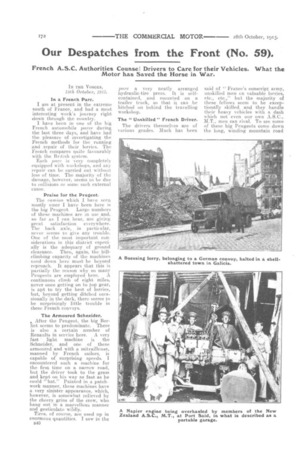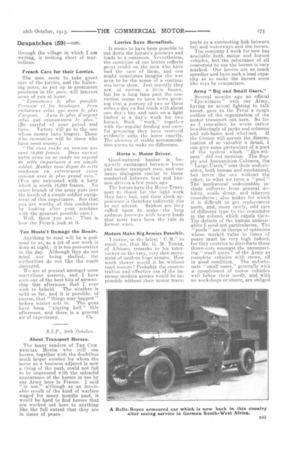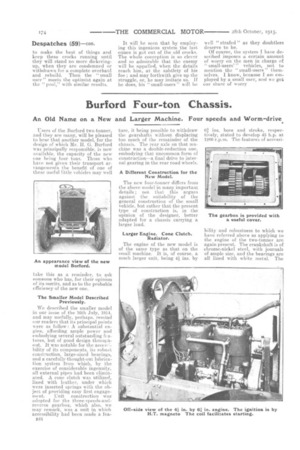Our Despatches from the Front (No. 59).
Page 12

Page 13

Page 14

If you've noticed an error in this article please click here to report it so we can fix it.
French A.S.C. Authorities CounseI Drivers to Care for their Vehicles. What the Motor has Saved the Horse in War.
Piq THE VOSGES, 131.h October, 1915.
In a French Pare.
I am at present in the extreme south of France, and had a most interesting week's journey right down through the country.
I have been in one of the big French automobile pares during
the last three days, and have had the pleasure of investigating the French -methods for the running and .repair of their lorries. The French compares quite favourably with the British system.
Each pare is very completely equipped with workshops, and any repair can be carried out without loss of time. The majority of the damage, however, seems to be due to collisions or some such external cause.' •
Praise for the Peugeot.
The caption which I have seen mostly since I have been here is the big Peugeot. Large numbers of 'these machines are in use and, so far as 1 ean hear, are giving great satisfaction everywhere. The back axle, in particular, never seems to give any trouble. One of the most important considerations in this district especially is the adequacy of ground clearance. Then, again, the hillclimbing capacity of the machines used down here must be beyond reproach. Itappears that this is partially the reason why so many. Peugeots are employed here.A continuous climb of eight miles, never once getting on to fop gear, is apt to try the best. of lorries, but, beyond getting ditched occasionally in the dark, there seems to be surprisingly little trouble in these French convoys.
The Armoured Schneider.
After the Peugeot, the big Berbet seems to predominate. There is also a certain number of Renaults in service here. A very fast light machine is the Schneider, and one of these armoured and with a mitrailleuse, manned by French sailors, is capable of surprising speeds. I encountered such a machine for the first time on a narrow road, hut the driver took to the grass and kept on his way as fast as he could "bat." Painted in a patchwork manner, these machines have a very sinister appearance, which, however, is somewhat relieved by the cheery grins of the crew, who hang out in a marvellous manner and gesticulate wildly. Tires, of course, are, used up in enormous quantities. I saw in the B40 pare a very neatly arranged hydraulic-tire press. It is selfcontained, and mounted on a trailer truck, so that it can be hitched on behind the travelling workshop.
The " Unskilled " French Driver.
The drivers themselves are of various grades. Much has been
said of " France's conscript army, unskilled men on valuable lorries, etc., etc.," but the majority of these fellows seem to be .exceptionally skilled, and they handle their heavy vehicles with a .dash which not even our own A.S.C., M.T., men can rival. To see some of these big Peugeots come down the long, winding mountain road
through the village in which I am writing, is nothing short of marvellous.
French Care for their Lorries.
The men seem to take great care of the lorries, and the following.notes, as put up in prominent positions in the pare, will interest some of you at home.
" Econorntscz le plus possible l'essence et les bandages. Sera victorieux mita qui aura le plus d'argent. Aura le plus d'argent eetui economisera le plus," (Be careful of your petrol and tires. Victory will go to the one Whose money lasts longest. Those who economize will be those who have most money.)
" On VOUS confie 1171 camion qui vent 18,000 francs. Dans anCline
ant cc arme on ne confie capital de cette importance a 1.171 simple soldat. illontez VOW digne de cette confiance en entretertant votre minion avec le plus grand soin." (You are entrusted with a lorry which is worth 18,000 francs. No other branch of the army puts into the hands of a simple soldier equipment of this importance. See that you are worthy of this confidence by looking after your machine with the greatest possible care.) Well, there you are ! That is how the French look at it.
You Mustn't Damage the Roads,.
Anything to read will be a godsend to us, as a lot of our work is done at night ; it is tooprovocative in the day. Although they do not mind our being shelled, the authorities do not like the roads damaged.
We are at present amongst some marvellous scenery, and I have seen one of the best bits of airmanship this afternoon that I ever wish to behold. The weather is mild so far, and it is possible, of course, that "things may happen " before winter sets in. The guns have been "playing hell " this afternoon, and there is a general air of expectancy. CL.
S.I.F., 20th October. About Transport Horses.
The many readers of THE COMMERCIAL MOTOR who still use horses, together with the doubtless much larger number for whom the horse as a business adjunct is now a thing of the past, could not fail to be impressed with the splendid appearance of the horses in use by our Army here in France. I said "in use," although as an inevitable result of the kind of warfare waged for many months past, it would be hard to find horses that are worked out here to anything like the full extent that they are in times of peace. Lorries Save Horseflesh, It seems to have been possible To cut down the horses'.s journeys and loads to a minimum. Nevertheless, the condition of our horses reflects gant, credit on the men who have had the care of them, and one might sometimes imagine the war area to be the scene of a continuous horse show. Just recently they are, of course, a little busier, but for a long time past the conviction seems to have been growing that. a journey of two or three miles a day on flat roads with about one day's hay and oats on a light limber is a daY's work for two horses. Such " work," together with the regular feeding and careful grooming they have received evidently suits the horse exactly. The a bs en ce of stable accommodation .seems to make no difference.
Horse v. Motor Driver.
Good-natured banter is frequently exchanged between horse and motor transport men, and one hears dialogues similar to those conducted between taxi and hansom drivers &low years ago.
The horses-have the Motor Transport to thank for the light work they have had, and their sleek appearance is therefore indirectly due to our advent. Seldom are they caPled upon to make the long arduous journeys with heavy loads that must have been the rule in former wars., Motors Make Big Armies Possible.
I notice, in the latest. " C.M." to reach me, that Mr. G. M. Young, of Albions, remarks to his interviewer on the very, very slow movement of modern huge armies. How much slower would it be without road motors? Probably the concentration and effective use of the immense modern armies would be impossible without their motor trans
ports as a connecting link between rail and waterways and the horses. The company I work for now has available both motor and horsed vehicles, but the reluctance of all concerned to use the horses is very marked. Our lorries are so much speedier and have such a load capacity as to make the horses seem like toys by comparison.
Army "Big and Small Users."
Several months ago an official " Eye-witness" with our Army, having no actual fighting to talk about, gave to the Press a rough outline of the organization of the motor transport out here. So far as I remember, he wrote rather bewilderingly of parks and columns
and sub-bases and what-not. if the Censor will permit the dissemination of so valuable a detail, I can give some particulars of a part of the system which " Eye-witness" did not mention. The Supply and Ammunition Columns, the Large Users," sent their undesirables, both human and mechanical, but never the one without the other, to what we term a "
The mechanical undesirables include sufferers from general debility, senile decay, and inherent cussedness ; also makes for which it is difficult to get replacement parts, and, more rarely, odd cars of different type to the remainder in the column which expels them. The defects of the human undesirables I need not particularize. The " pools " are in charge of optimists whose market value in times of peace must be very high indeed, for they contrive to distribute these throw-outs amongst the unsuspecting "small users" of the Army as complete vehicles with crews, all in good condition. The unfortunate " small users," generally with a complement of motor vehicles well below their needs, and with no workshops or stores, are obliged
to make the best of things and keep these crocks running until they will stand no more dickeringup, when they are condemned or withdrawn for a complete overhaul and rebuild. Then the 4` small user" meets the optimist again at the " pool," with similar results. It will be seen that by employing this ingenious systein the last ounce is got out of the old crocks. The whole conception is so clever and so admirable that the enemy will be appalled, when the details reach him, at the subtlety of his foe ; and may forthwith give up the struggle, or, he may imitate us. If he does, his " small-users " will be
well " strafed " as they doubtless deserve to be.
Of course, the system 1 have described imposes a certain amount of worry on the men in charge of " small-users'" vehicles, not to mention the "small-users'' themselves. I know, because I am employed by a small user, and we get our share of worry






















